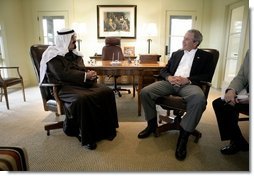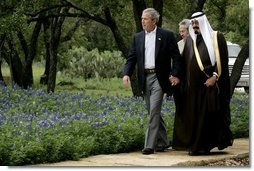
 |
For Immediate Release
Office of the Press Secretary
April 25, 2005
Joint Statement by President Bush and Saudi Crown Prince Abdullah
Crawford, Texas
Sixty years ago, President Franklin D. Roosevelt and the Kingdom of Saudi Arabia's founder King Abdulaziz Al Saud held a historic meeting upon a sturdy ship at the Great Bitter Lake in the Suez Canal. In six hours President Bush's predecessor and the Crown Prince's father established a strong personal bond that set the tone for decades of close relations between our two nations.
 Today, we renewed our personal friendship and that between our
nations. In our meeting we agreed that momentous changes in the world
call on us to forge a new relationship between our two countries -- a
strengthened partnership that builds on our past partnership, meets
today's challenges, and embraces the opportunities our nations will
face in the next sixty years.
Today, we renewed our personal friendship and that between our
nations. In our meeting we agreed that momentous changes in the world
call on us to forge a new relationship between our two countries -- a
strengthened partnership that builds on our past partnership, meets
today's challenges, and embraces the opportunities our nations will
face in the next sixty years.
Our friendship begins with the recognition that our nations have proud and very distinct histories.
The United States respects Saudi Arabia as the birthplace of Islam, one of the world's great religions, and as the symbolic center of the Islamic faith as custodian of Islam's two holy places in Makkah and Madina. Saudi Arabia reiterates its call on all those who teach and propagate the Islamic faith to adhere strictly to the Islamic message of peace, moderation, and tolerance and reject that which deviates from those principles. Both countries agree that this message of peace, moderation, and tolerance must extend to those of all faiths and practices. The two nations reaffirm the principles agreed to during the international conference on counterterrorism hosted by the Kingdom in February 2005. These principles were enshrined in the "Riyadh Declaration" which calls for, "fostering values of understanding, tolerance, dialogue, co-existence, and the rapprochement between cultures. . . [and] for fighting any form of thinking that promotes hatred, incites violence, and condones terrorist crimes which can by no means be accepted by any religion or law."
The Kingdom of Saudi Arabia recognizes the principle of freedom upon which the United States was founded, including the freedoms enshrined under the first amendment of the United States Constitution. The Kingdom appreciates the United States' historic role in working to end colonialism and imperialism and promoting the right of self-determination.
While the United States considers that nations will create institutions that reflect the history, culture, and traditions of their societies, it does not seek to impose its own style of government on the government and people of Saudi Arabia. The United States applauds the recently held elections in the Kingdom for representatives to municipal councils and looks for even wider participation in accordance with the Kingdom's reform program.
The Kingdom of Saudi Arabia and the United States are close partners in many important endeavors. We welcome the renewed determination of Saudi Arabia to pursue economic reform and its quest to join the World Trade Organization (WTO). We will work together as partners to complete our negotiations and with other WTO members in Geneva with the aim of welcoming Saudi Arabia into the WTO before the end of 2005.
 Both nations pledge to continue their cooperation so that the oil
supply from Saudi Arabia will be available and secure. The United
States appreciates Saudi Arabia's strong commitment to accelerating
investment and expanding its production capacity to help provide
stability and adequately supply the market.
Both nations pledge to continue their cooperation so that the oil
supply from Saudi Arabia will be available and secure. The United
States appreciates Saudi Arabia's strong commitment to accelerating
investment and expanding its production capacity to help provide
stability and adequately supply the market.
The Kingdom of Saudi Arabia and the United States commit to actively help the Iraqi people realize their aspirations to build a secure, sovereign, prosperous, and unified nation at peace with its neighbors and where Iraqis of all religions and ethnic groups are free to participate in its institutions. Both nations call on the international community to support Iraq's political and economic development. Both nations urge neighboring states not to interfere in Iraq's internal political affairs.
Both our nations have witnessed the horror of terrorism on our homelands by violent individuals and groups who indiscriminately kill people of all faiths and nationalities in order to further their extremist agenda. Both our nations assert our determination to continue to improve upon our close cooperation to combat terrorism and to choke off resources intended for them and their support networks. We honor the memory of the victims of terrorism-and those who have lost their lives fighting terrorists-and pledge to work together until terrorism no longer threatens our nations and the entire world.
The United States and Saudi Arabia continue to support efforts to prevent the spread of nuclear weapons, and of the technology and materiel needed to develop and build nuclear weapons. Efforts to develop and acquire such weapons run contrary to efforts to promote peace and stability in the region.
The United States and Saudi Arabia support UN Security Council Resolution 1559 and, accordingly, take note of Syria's decision to withdraw all its troops and intelligence personnel from Lebanon. Both nations welcome a provisional Lebanese government and look forward to free and fair elections unburdened by foreign interference or intimidation.
With regard to the Palestinian-Israeli conflict, the United States and the Kingdom of Saudi Arabia desire a just, negotiated settlement wherein two democratic states, Israel and Palestine, live side by side in peace and security. We will continue our efforts to achieve this objective, and reiterate our support for the efforts of the Palestinian Authority to bring democracy, peace, and prosperity to all Palestinians. The United States thanks Crown Prince Abdullah for his bold initiative-adopted unanimously by the Arab Summit in 2002-that seeks to encourage an Israel-Palestinian and Israel-Arab peace. We believe that an Israeli withdrawal from Gaza and parts of the West Bank will be a significant step forward toward implementation of the Road Map. It is our firm conviction that resolving the Palestinian-Israeli conflict will remove a major source of tension and contribute to stability and progress in the region.
Finally, the United States and Saudi Arabia agree that our future relations must rest on a foundation of broad cooperation. We must work to expand dialogue, understanding, and interactions between our citizens. This will include programs designed to (1) increase the number of young Saudi students to travel and study in the United States; (2) increase our military exchange programs so that more Saudi officers visit the United States for military education and training; and (3) increase the number of Americans traveling to work and study in the Kingdom. The United States recognizes we must exert great efforts to overcome obstacles facing Saudi businessmen and students who wish to enter the United States and we pledge to our Saudi friends that we will take on this effort. A high-level joint committee has been established to be headed by the Saudi Foreign Minister and the U.S. Secretary of State that will deal with strategic issues of vital importance to the two countries.
# # #